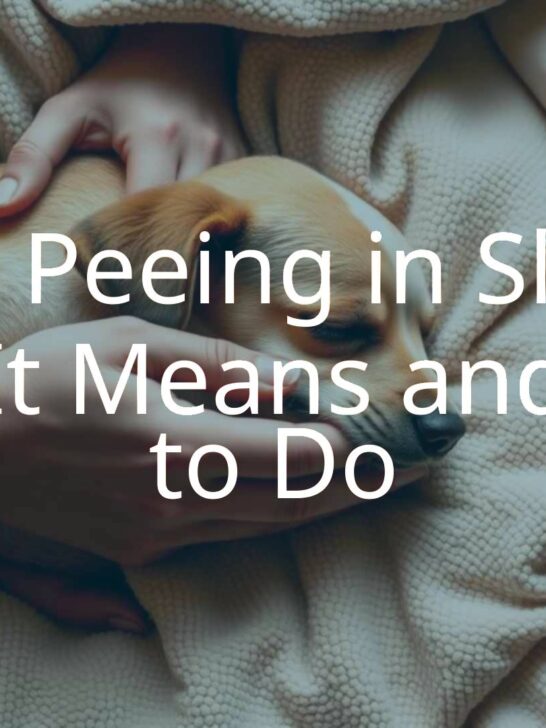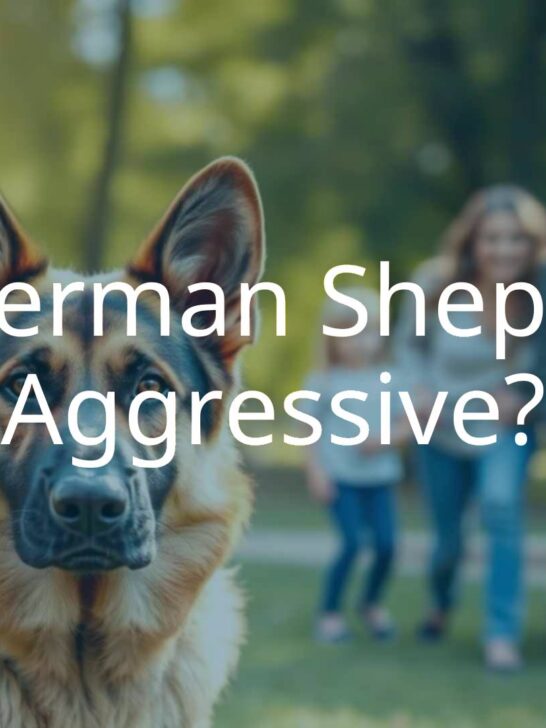Stopping Your German Shepherd From Jumping Over Fences: The Essential Guide
German Shepherds are athletic dogs, with a jump that’s impressive to watch. Their long and powerful limbs propel them over heights far greater than you’d imagine.
While we may be amazed at the athleticism, it’s less impressive when it’s the garden fence they’re leaving behind.
When a German Shepherd discovers the fun of jumping fences, you need to take steps to keep them safe at home.
This guide will provide you with the help you need to keep your German Shepherd in the backyard, so you can stay free from worry.
Short Term Solutions
If your German Shepherd has already started clearing fences, then your immediate action should be to prevent them from getting out.
These short-term solutions keep your dog inside the yard, while you work on their behavior.
Add some height to the fence
German Shepherds have a pretty good jump, but that doesn’t mean they can get over anything. A few extra feet could be all you need to keep your dog safely in the yard.
If you have a fence that’s 4 to 5 feet high, then your German Shepherd likely has no problem getting over. Even a 6 to 7 foot fence might not stop them completely, but it is a good start.
At a minimum, the fence should be 6 feet high. A German Shepherd might not find this impossible to clear, but the additional challenge it presents can act as a deterrent.
An easy way to add height to your fence, without requiring expensive building work, is to use chicken wire.
This can be stapled across the top of the fence to give instant height, and stop your dog from getting a foot (or paw) hold.
Another option is installing coyote rollers. These are smooth, rolling tubes that are fixed along the top of the fence.
When the German Shepherd goes to grab the fence, they can’t find friction on the moving surface, and fall back into the yard.
Identify how they’re jumping out – and remove any escape aids
It may be that your German Shepherd is making a clean jump over the fence, or they may be getting a helping hand from items around the garden.
Keep an eye out for the next time they jump, to see whether the yard’s providing an unwilling obstacle course.
Chairs, bushes, trash cans, dog houses, even small trees might be giving your German Shepherd the boost they need for clearance.
If your dog is climbing, then remove the aids and add some deterrents. Laying chicken wire on the ground can help, as dogs don’t like the feeling of it on their paws.
Some will do what they can to avoid walking over uncomfortable wires.
For those with a chain link fence, even a very high one, you may find this is what’s causing the problem.
A German Shepherd can use the fence effectively as a climbing wall, getting them up and over with little problem.
Finding out if your dog is climbing or jumping makes it easier to stop the escapes. However, be aware that none of this is getting to the cause of the problem – it’s simply providing a quick fix.
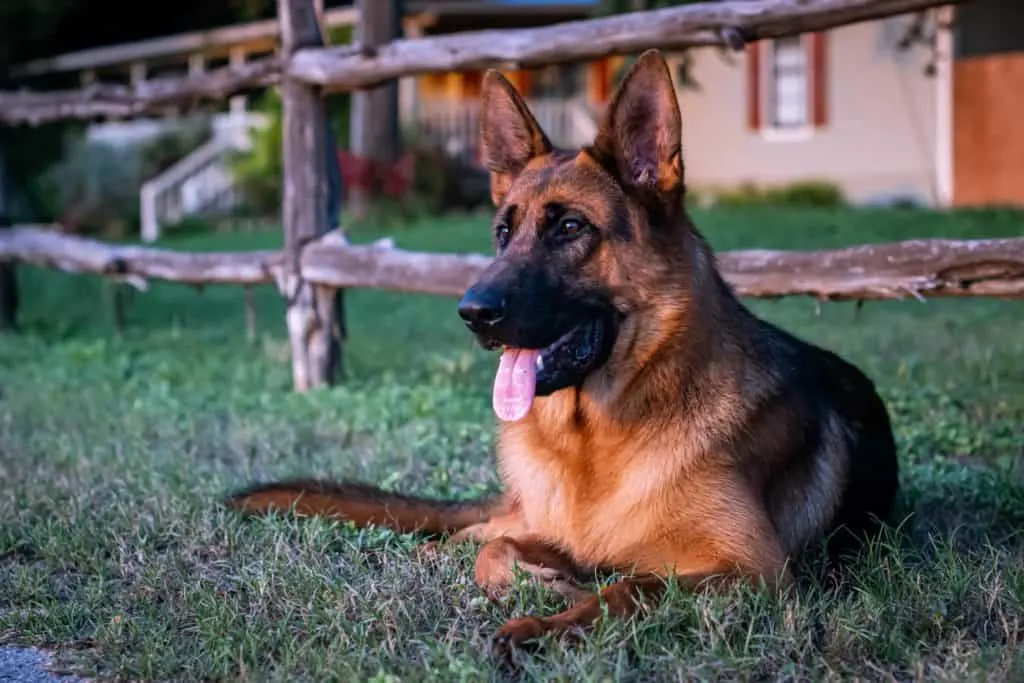
Block their view of outside temptations
We all know the phrase “the grass is greener on the other side”. Well, dogs feel that way too.
And sometimes they can actually see how much better that grass is, or at least how much more interesting it is compared to the yard they spend their days in.
If there are gaps in your fence, or you have a chain link fence, then your German Shepherd might be seeing all kinds of exciting things through it.
Joggers, cats, other dogs, shiny cars, that elusive postman… all present your dog with thrilling opportunities. They’ll put all their effort into getting over that barrier that’s keeping them from a chase.
Use closed fencing, reed fencing, or plastic sheeting to cover up any gaps. If you have a chain link fence, it may need replacing altogether.
When the dog can’t see out, they’re less likely to spot something that compels them to jump.
Make your yard more interesting, and a safe place
If your German Shepherd is happy in the yard, there outside presents fewer opportunities. The yard should be a place your dog likes to be, where they feel safe and happy.
Use the yard for playtime. Practice obedience training, introduce new toys, and give them rewards outside. This helps them to form positive associations with the yard.
If you have a jumpy or nervous pup, consider building a dog house. They might be jumping because they’ve been frightened, and a dog house will give them somewhere to retreat towards instead.
When you’re not spending time with them, leave things in the yard for entertainment. Look for a food dispensing toy, which keeps the dog engaged and rewards them with yummy treats.
Or try hiding a few small treats around the garden. Change up their toys regularly, so they don’t get bored playing with the same thing. On hot days, bring out a kiddie pool for them to splash about in.
If they can stay busy in the yard, they’re less likely to look elsewhere for entertainment. But avoid leaving your German Shepherd alone in the yard for too long.
Check to see if they’re okay regularly, or bring them indoors.
Corrections to use to stop your dog from jumping
If your German Shepherd is jumping over fences, they need to be corrected. They probably think they’re having fun, and don’t see a problem. They need to be taught that the behavior is wrong.
Practice correcting them, to teach them it’s better to avoid the fence.
- Use a training collar attached to a long leash. It should be long enough that they can move around the yard freely.
- Let your dog walk around. When it gets close to the fence, firmly tell them “no”.
- When the dog moves away, reward them for their good behavior.
- Leave them to sniff around again, telling them “no” whenever they get close to the fence, and rewarding them when they move away.
- Repeat this several times, and practice regularly. If you’re spending time in the yard with your German Shepherd, this is easy to work into the routine.
- Increase the difficulty by having a friend or family member stand on the other side of the fence.
- The German Shepherd will try to get over the fence to see the friend. Stop their movement, and be firm with telling them “no”.
- Reward and praise the dog when it obeys you.
- Repeat until your dog stops trying to jump.
It’s important to be firm with these corrections, but avoid being harsh. Shouting at your dog when it jumps only gives them attention.
When they feel restless, they’ll crave attention, good or bad, and start jumping. You also shouldn’t hit your dog as punishment. This only teaches them to fear you, when we want to foster trust.
During this exercise, keep an eye out for signs that your dog is thinking of jumping. When you can identify this behavior, it’s easier to stop them when they’re gearing up.
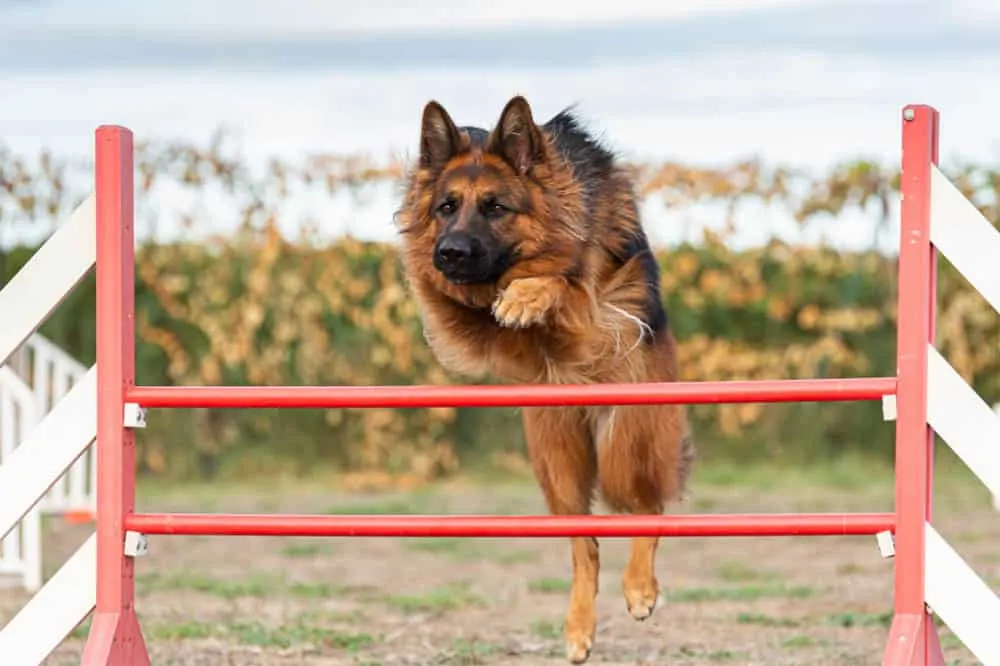
Long Term Fixes
Once you’ve made sure the German Shepherd can’t get out, now is the time to find the heart of the matter. Understand the motivation, and work to meet their needs.
Start obedience training
While simple corrections are good for fighting a problem directly, you should always look into obedience training. A large dog like a German Shepherd can particularly benefit from training.
Good training teaches them to recognize bad behaviors, respond to commands, and helps you form a close bond.
Obedience training is best for puppies, but older dogs can learn too. It’s never too late to start. You can pay for professional help, attend a class, or have a look online for courses.
German Shepherds are intelligent dogs, which means they respond well to training. They’re actually considered a very easy dog to train.
It may take several weeks, especially for an older dog, but in time they should respond to repetition.
Training is an important step, but it can’t work on its own. Even a well-trained dog left alone gets bored and can act out. Training should be combined with other efforts to keep your dog happy and entertained.
Provide them with the right mental stimulation
As we said, German Shepherds are intelligent dogs. When you want to wear them out, they need to be mentally as well as physically stimulated.
As an intelligent dog becomes bored, they look for their own ways to entertain themselves.
Which can result in the garden becoming an obstacle course to conquer, so they can explore the wider world.
To prevent your German Shepherd from constantly hunting out new experiences, the yard needs to be kept exciting.
Use games and toys that present the dog with a challenge. Look for toys that provide dogs with a challenge. Find ways to hide treats in household objects, so the dog has to work to get a surprise.
Shake things up from time to time. A German Shepherd can grow bored if it only ever has access to the same toys. Keep their toys on a rotation, so they never have time to get tired.
Provide them with the right physical stimulation
As well as being smart, German Shepherds are big dogs.
They need a fair amount of exercise to tire them out. It isn’t enough to just let them off the leash in the backyard a few times a day: you need to make an effort to get them active.
German Shepherds need at least 2 hours of physical activity per day. If they aren’t getting that, it may be the reason why they’re acting out and jumping fences.
The best trained dogs will still misbehave if they aren’t receiving the care they need. They become restless, and need to find ways to express this physically.
It isn’t enough just to let your dog off the leash, especially one as smart as a German Shepherd.
If you take them for a half hour walk and assume they’ll wear themselves out alone in the yard, then your dog is probably only getting half an hour of proper exercise. Left alone, they won’t play in the same way.
When you let your dog into the backyard, go out from time to time to engage in play. Your German Shepherd will have a chance to burn off the excess excitement, and you can see how they’re doing.
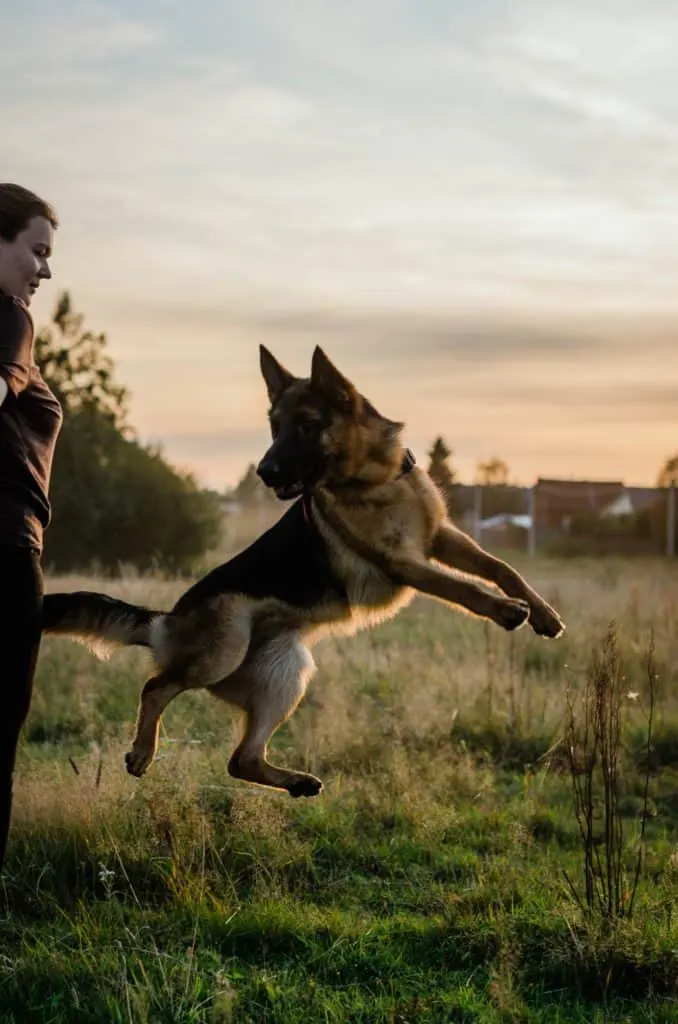
Start to love walks
If you want to own a happy and content German Shepherd, you’re going to need to keep up with it.
Rather than hoping it will take charge of its own exercise, you must take charge of keeping them entertained. If you aren’t willing to make that commitment, then you shouldn’t own a German Shepherd.
A lack of exercise is often the cause of a German Shepherd’s poor behavior. Walks need to become your new favorite activity.
Take your dog out more than once a day, or if you only have time for once, make it a really long walk.
If you can’t make the time commitment, look into a dog walker. They can take care of your German Shepherd when you aren’t around, and ensure they’re getting the physical stimulation necessary.
Another advantage: the more time the dog is out of the house, the less time that can be spent trying to jump the fence.
Find the right solution by identifying the cause
To find the perfect solution for your dog, you need to find the reason they’re jumping. There are all kinds of reasons why your German Shepherd might be making the leap, and one solution doesn’t fit all.
Your dog might jump because:
- They’ve seen something interesting outside, and they want to find it.
- They’ve seen something interesting outside, and they want to chase it.
- They’re bored, and they think the outside will provide entertainment.
- They’re bored, and they want some attention.
- They’re restless, and they need to use up excess energy.
- Something is threatening their territory, and they need to scare it off.
- They’re feeling anxious from missing you, and they want to find where you are.
- Something has scared them, or they’re anxious from being outside, and they want to find safety.
- If they aren’t neutered/spayed, then they might be looking to mate.
When you know the root cause, you can really fix the problem. Although it may just be that your dog loves to jump, it’s much more likely that something is motivating them.
By understanding the cause, you can tailor a solution to fit.
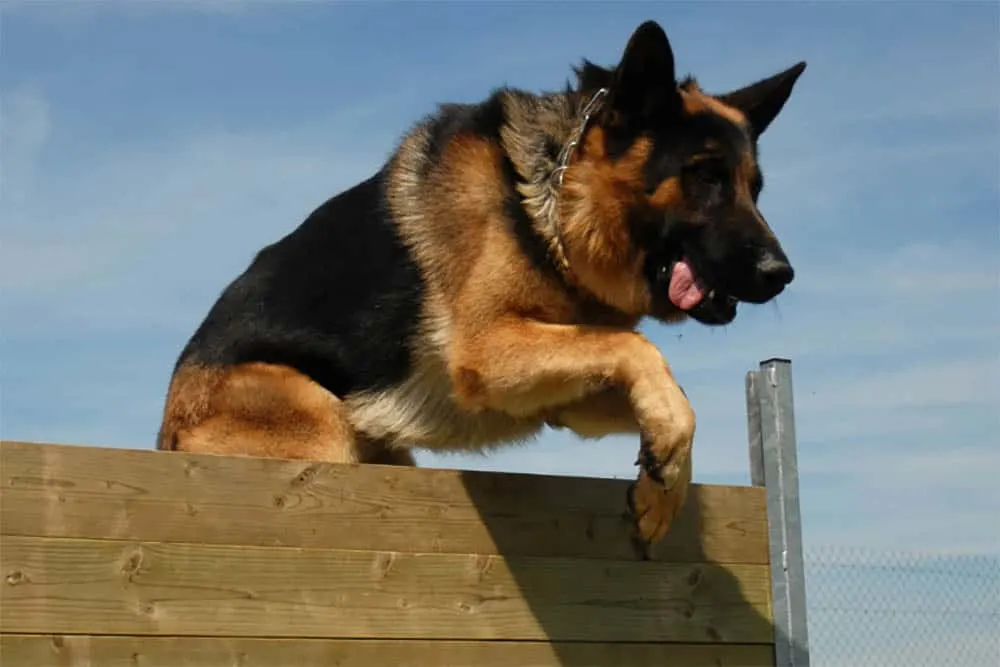
How high can a German Shepherd Jump?
Without any run up, a German Shepherd can jump a height of 4 to 6 feet. With a run-up, a German Shepherd can clear even higher fences.
Some have reported their German Shepherds making it over fences that are 10 feet high! If you have a large and healthy German Shepherd, you may be amazed at the heights they can reach.
Alongside this big jumping ability, German Shepherds are smart enough to climb. Give them a few places to put their paws, and they can make their way over very large fences.
A 6-foot fence is the minimum height requirement. This should be enough to prevent a normal German Shepherd from making an easy jump.
However, if you have a big yard (or a big dog), you probably want to add at least an extra foot.
Final thoughts
German Shepherds are smart dogs with lots of energy – which means they need entertainment! The best way to ensure your dog never jumps over fences is to stop it happening in the first place.
To do so, keep them entertained, both physically and mentally. Spend time with them when they’re in the yard. Give them the attention they deserve, and the exercise they need.
If your German Shepherd is already jumping fences – don’t panic. There are things you can do. In the short term, work on making it difficult for them to escape.
In the long term, deal with the behavior at the heart of the issue.
Training your German Shepherd is essential to keeping everyone happy. While you get on with turning corrections into playtime, someone else can work on adding chicken wire to the fence!















